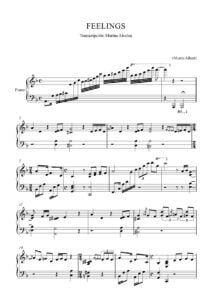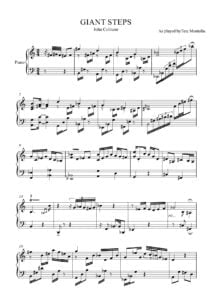Tete Montoliu –Playlist

Best Sheet Music download from our Library.
Who was Tete Montoliu?
Tete Montoliu, an unrepeatable genius
The Catalan pianist Tete Montoliu, the most prestigious and universally recognized of our jazz musicians, left us on August 24 at 11:40 a.m. at the Barcelona Clinical Hospital, at the age of 64, as a result of lung cancer that left him It was detected in November of last year, when he was admitted due to an arrhythmia.
His dramatic fight against the disease, which was reserved for the privacy of the family, did not prevent the pianist from continuing to attend a schedule full of concerts until very recently and except for some inevitable suspensions, in which he was able to overcome adversity by offering the best of his enormous talent.
Please, subscribe to our Library. Thank you!
The news of his death has caused a great commotion, and there have been multiple expressions of pain that have transcended the musical field. With his disappearance, not only is there an immense void left in the jazz scene, but it can be said that Spanish music loses one of its greatest geniuses. As Teddy Bautista, general secretary of the General Society of Authors and Editors, recalled, Tete was unrepeatable.
Vicenç Montoliu Massana, universally known as Tete Montoliu, was born in Barcelona in 1933. His father was a regular musician in the Liceo Orchestra and the Barcelona Municipal Band. Given his extraordinary musical talent, he begins to receive classes from the pianist Petra Palou, whom Tete always considered his teacher. Overcoming the difficulties imposed on him by the fact of being born blind, he entered the Barcelona Municipal Conservatory at the age of 16, where he completed his studies. Although his father would have preferred his dedication to classical music, his firm intention was to become a jazz pianist, since his mother had instilled in him a passion for this music through her collection of recordings by Duke Ellington, Art Tatum, Earl Hines or Fats Waller.
Although his first steps occurred in commercial music, since his adolescence he had participated in the jam-sessions of the Hot Club in Barcelona, he had led the Be-Bop quartet, and he had even shared several sessions with the legendary saxophonist Don Byas between 46 and 47, which would forever mark his choice for jazz. His take-off occurred in 1955, when Lionel Hampton visited the Barcelona club where he played and after being amazed by his performance, he invited him to tour with him and to participate in his first important recording in 1956 (although he never liked it). how it turned out), the album Flamenco Jazz.
In 1958, he performed at the Cannes Festival in a trio with Doug Watkins and Art Taylor. In 1961, he was called to join the European All Stars, which brought together the best jazzmen of the old continent. Shortly after he was hired by the Blue Note in Berlin, where he shared the stage with Chet Baker, Benny Bailey and Slide Hampton. From then on his career as a pianist was unstoppable following his stay in Copenhagen, where he performed and recorded with extraordinary musicians such as Kenny Dorham, Archie Shepp, Ben Webster, Benny Golson, Stéphane Grappelli and especially Dexter Gordon, with whom he recorded numerous recordings and Roland Kirk (another brilliant blind man), with whom he formed a famous quartet.
During that time he alternated his visits to Berlin or New York with long stays at the Whiskey Jazz in Madrid, where he shared the stage with the saxophonist Pedro Iturralde, and the Jamboree in Barcelona, where he formed his first great trio with the double bassist Eric Peter and the drummer Billy Brooks and accompanies such notable musicians as Booker Ervin, Donald Byrd, Lucky Thomson, Pony Poindexter, Lee Konitz, Art Farmer and Ornette Coleman.
In 1967, he traveled to New York on a tour that achieved considerable success. During his stay in the United States, he recorded an album for Impulse! with Elvin Jones and Richard Davis, which was never published.
Returning to Europe, he often recorded in Holland and Denmark, already becoming a hard-bop legend. The albums and performances with George Coleman, Anthony Braxton, Niels-Henning Ørsted Pedersen and Barney Wilen follow one another. Starting in the 1980s, he performed many concerts with artists of the caliber of Johnny Griffin, Joe Henderson, Eddie Davis, Sonny Stitt, Freddie Hubbard, Jerome Richardson, Dizzy Gillespie, Bobby Hutcherson, Chick Corea, Hank Jones, Roy Hargrove, Jesse Davis…
In full maturity he tackles such fabulous undertakings as the series of four solo piano albums “The Music I Like To Play”, recorded in Milan for the Soul Note label, perhaps his most important work. In recent years he alternates his trio concerts with Horacio Fumero and Peer Wyboris with his solo performances and continues to expand his boundaries (after having dedicated several albums to South American and Catalan themes throughout his career) with new experiences such as his reworking of classic boleros with the singer Mayte Martín, thus completing nearly a hundred albums.
In 1996, he received one of the many tributes to his career with a concert at the Teatro Monumental in Madrid, in which he was accompanied by Gary Bartz and Tom Harrell. In November of that year, he suffered a sudden cardiac arrhythmia that required the implantation of a pacemaker. His condition is complicated when lung cancer is detected. Despite this, the best example of the musical greatness of Montoliu’s last days was the concert given last March at the Palau de la Música in Barcelona to celebrate his 64th birthday, a masterful performance in which he performed songs from Ellington, Coltrane, Dexter Gordon, and Thelonious Monk and will soon be released in record format following his own wishes.
With his death on August 24, 1997, his career was definitively unfinished, broken precisely at one of its high points. Tete Montoliu had, among other awards, the National Music Prize, the Cross of Sant Jordi from the Generalitat of Catalonia, the Medal of Merit from the Barcelona City Council and an honor that he highly valued: the gold and diamond insignia of Barça, his second passion after jazz.

